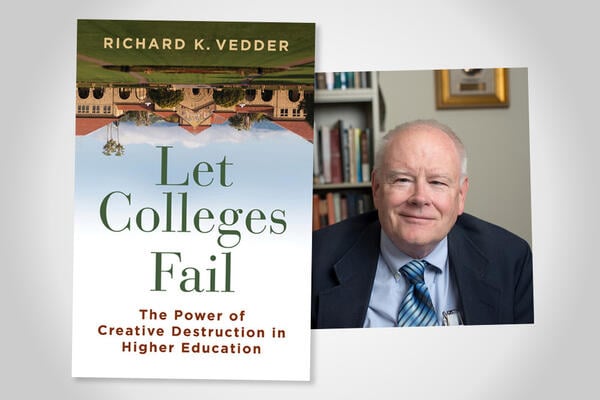Richard Vedder Advocates for Creative Destruction in Higher Education

Richard Vedder, an esteemed economic historian with a passion for teaching, has made a striking impact on the discourse surrounding higher education. Remarkably, he dedicated his honeymoon over fifty years ago to a group of 43 students in Italy, a testament to his commitment to education. Now, at the age of 84, Vedder has authored a new book titled Let Colleges Fail: The Power of Creative Destruction in Higher Education, published by the Independent Institute. In this provocative work, he argues that colleges and universities have deviated significantly from their fundamental mission of disseminating and discovering knowledge. Vedder proposes a radical overhaul of the higher education system, suggesting that institutions should operate more like corporations to improve their effectiveness and public perception.
As the Distinguished Emeritus Professor of Economics at Ohio University and founding director of the Center for College Affordability and Productivity in Washington, D.C., Vedder offers a wealth of experience and insight. In a recent interview with Inside Higher Ed, he elaborated on his views, which he believes could help colleges regain their lost credibility.
The title of Vedder's book, Let Colleges Fail, indeed raises eyebrows. When asked if he truly believes some colleges should fail, he explained, Its a provocative title. But what I say is colleges need to step up their game, or theyre going to fail. He argues that the fear of failure could motivate institutions to enhance their efficiency, urging them to reallocate resources from less productive areas to those that directly contribute to their core mission of education.
Vedder emphasized that many colleges at risk of closure are those with marginal reputations, noting a troubling trend in higher education. He highlighted that total college enrollment has been on the decline since 2010, despite the slow growth of the U.S. population. This decline is unprecedented, marking a significant shift in the landscape of higher education that has not been seen outside of recession or wartime.
He further elaborated on his fundamental thesis: colleges and universities need to adopt a business-like approach, demonstrating accountability and delivering returns on their services. If you take the Fortune 500 company list for the year 2000 and compare it with todays list, maybe six out of the top 25 companies remain the same, he pointed out, underscoring that businesses adapt or face decline. In contrast, Vedder lamented that the higher education sector lacks a clear measure of success, complicating efforts to identify high-performing institutions.
When discussing public perception of higher education, Vedder noted a significant decline in trust, attributing this to high tuition costs, perceived political biases, a lack of rigor, and detachment from societal needs. He acknowledged that even defenders of higher education might agree with his criticisms but still push for internal reforms rather than a complete overhaul.
I want higher ed to succeed, he affirmed, expressing his love for the American education system, which he believes remains the best worldwide. However, he firmly believes that institutions must take action to reduce costs and refocus on their primary responsibilities: teaching and research. He criticized the distractions that have emerged in academia, such as lavish sports programs, which divert attention from educational goals.
One critical factor contributing to skyrocketing tuition costs, according to Vedder, is the expansion of student loan programs. He explained that from 1980 to 2020, college tuition increased far more than wages, making education increasingly unaffordable. This financial burden has fostered public resentment and tarnished the reputation of colleges, which are often seen as self-serving entities.
On the topic of whether higher education is a public good, Vedder expressed skepticism. He acknowledged some public benefits of a college education but argued that the primary advantages accrue to the individuals who attend. He cautioned that the negative externalities associated with certain negative actions taken by universities could detract from the overall good of education.
When asked about the disparity of opportunity in education and the role of Diversity, Equity, and Inclusion (DEI) initiatives, Vedder recognized the good intentions behind such programs while emphasizing that their implementation sometimes goes awry. He pointed out that excessive funds raised from student loans have often been funneled into administrative salaries rather than supporting students.
Vedder acknowledged the challenges faced by small regional colleges, particularly those serving remote communities, and addressed the potential fallout of their closures. However, he reassured that the loss of such institutions would not completely strip students of access to higher education. He noted that the decline in the college population could lead to necessary mergers between nearby schools, which could benefit students by providing more resources and opportunities.
Reflecting on the rise of online education, Vedder admitted that his perspectives have shifted. While he initially saw the potential for online learning, he realized through his pandemic-teaching experience that personal interactions with students are irreplaceable. He believes that education encompasses more than just coursework; it involves cultural exchanges and personal connections that online platforms struggle to replicate.
In closing, Vedder's call for colleges to adopt innovative strategies, including mergers, speaks to the need for a reimagined landscape in higher education. He believes that even the disruption caused by political changes, like those initiated by the Trump administration, may stimulate necessary transformations within the education sector. Sometimes chaos can lead to creative destruction, he noted, suggesting that upheaval could serve as a catalyst for much-needed reform in higher education.




















